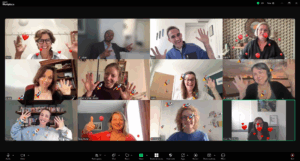Strong coaching cultures transform organisations.
Creating a coaching culture equips both leaders and teams with a mental model and a mindset through which they can better access potential. Developing coaching skills within a system accelerates connection and creativity. It allows inherent intelligence and capability to emerge. Strong coaching cultures also create a safety net in difficult times. With improved communication, empathy and resilience, members of the system are more able to stay connected, through the good and the bad.
So how exactly do you create a coaching culture? We believe all of the following are critical:
Everyone Is Right…Partially. In a coaching culture, it’s possible to hear all the voices in the system and to recognise that each holds a critical perspective for the system. Opinions aren’t ‘wrong’, even if they’re unpopular. They’re just information.
2. Celebrate Diversity. In a coaching culture, people actively seek out diverse people, ideas, perspectives and experiences. They share control and trust others to deliver. Even if they operate very differently.
3. Embrace Conflict. In a coaching culture, conflict is recognised as a signal that something new is trying to happen. Embracing conflict is a strategy to manage change constructively. How we interact while change is happening is more important than the change itself.
4. Share Power. In a coaching culture, information, resources, decision-making and credit are all shared. Leaders are careful not to ‘pull rank’. Mentoring and coaching is leveraged to increase individual capacity. Thus improving the collective capacity of the system.
5. Communicate Effectively. Coaching cultures don’t tolerate or support toxic communication patterns. They avoid blaming, defensiveness, stonewalling and contempt. Instead they promote openness, trust, vulnerability and curiosity.
6. Share Responsibility. In a coaching culture, partners are co-responsible for each other’s success and failure, and they hold one another accountable. Accountability is the keystone to developing trust and delivering results.
7. Embrace Change. In a coaching culture, there is a shared awareness that people respond to change differently. Unique perspectives are honoured. Change is not feared, but welcomed. In part because the system has established protocols for managing change
8. Seek Clarity. In a coaching culture there are well-defined and shared values that inspire positive actions. There is a shared optimism for the future. Members of the team or organisation are clear about their roles and responsibilities, and how they align with those values.
9. Share Knowledge. In a coaching culture, everyone recognises the value of sharing information. Having critical conversations creates a knowledge pool that benefits all the participants.
Dates for introductory courses in 2023 are below, you can register here.
- Fundamentals 8 | 9 September 2023 Virtual
- Fundamentals 12 | 13 October 2023 Virtual
- Fundamentals 26 | 27 October 2023 In-Person, London
- ORS@Work 17|18 November 2023 Virtual
We can help your organisation develop a stronger coaching culture. Get in touch to find out how. We’d love to hear from you.






